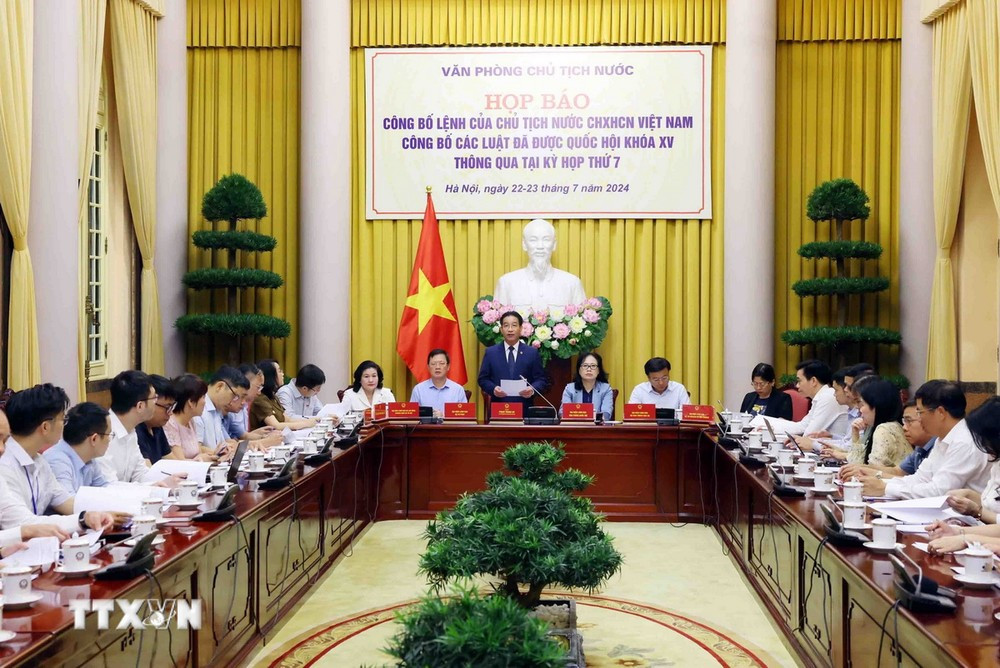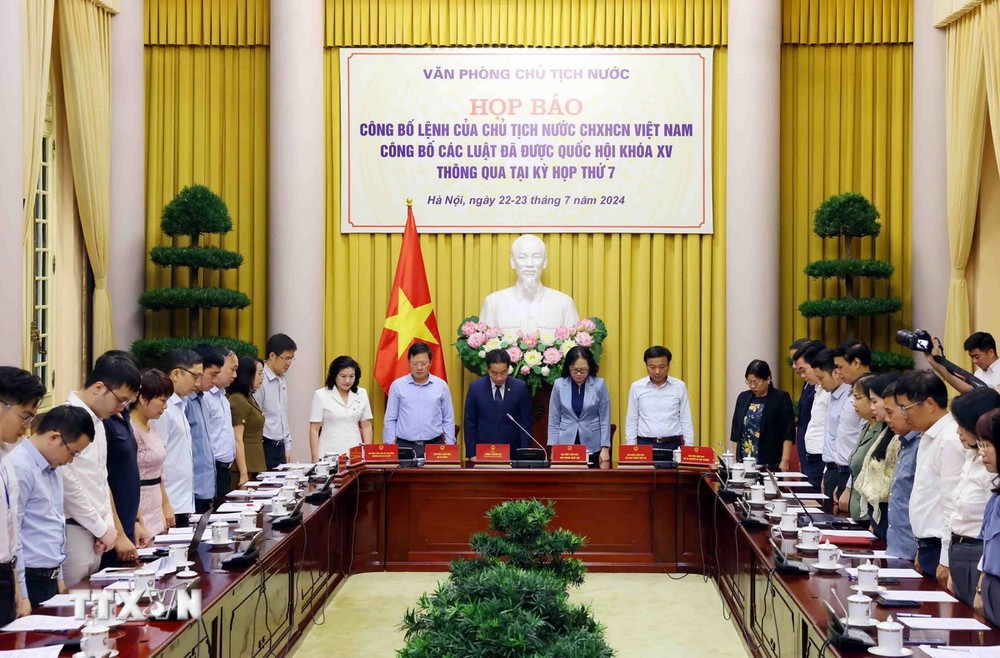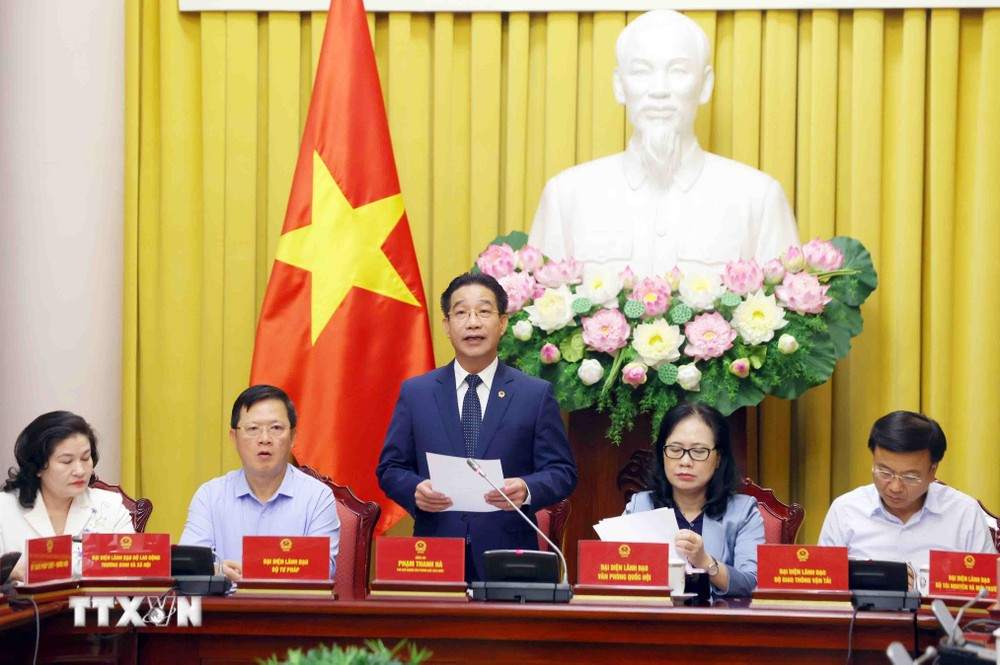The laws passed include the Capital Law; Law amending the Law on Property Auction; Law amending the Land Law, Housing Law, Real Estate Business Law; Law on Credit Institutions; Road Law; Law on Social Insurance.

On the morning of July 23, at the Presidential Palace, the Office of the President held a press conference to announce the President's Order promulgating the laws passed by the 15th National Assembly at the 7th Session, including: Law on the Capital; Law amending and supplementing a number of articles of the Law on Property Auction; Law amending and supplementing a number of articles of the Land Law, Housing Law, Real Estate Business Law; Law on Credit Institutions; Road Law; Law on Social Insurance.
Deputy Head of the Office of the President Pham Thanh Ha chaired the press conference.

Before starting the program, delegates and reporters attending the press conference observed a minute of silence to pay tribute to General Secretary Nguyen Phu Trong to express their respect and infinite condolences.
The Capital Law consists of 7 chapters and 54 articles, effective from January 1, 2025. The Capital Law continues to perfect the legal basis; build a unique and outstanding mechanism; overcome difficulties, obstacles and shortcomings arising in the implementation of the Capital Law to build and develop the Capital with the position and role as a political, administrative, economic and cultural center, towards a smart, modern, green, clean, beautiful, secure and safe urban area; develop rapidly, sustainably, and have a spreading effect to promote the development of the Red River Delta, the key economic region of the North and the whole country.

The law is based on the viewpoint and fully institutionalizes the Party's policies and guidelines on building and developing the Capital; stipulates outstanding special mechanisms and policies for the Capital, ensuring consistency with the Party's policies and guidelines and compliance with the 2013 Constitution.
The Capital Law needs to be placed within the overall legal system, not a law that replaces the entire current legal system, and applies specifically to the Capital. In addition, it is necessary to closely follow the 9 policy groups in the Proposal to develop the Capital Law (amended) approved by the Government to codify in the draft law specific mechanisms and policies, which are truly distinctive and have outstanding institutional breakthroughs to promote the strengths of the Capital.
Effective from January 1, 2025, the promulgation of the Law amending and supplementing a number of articles of the Law on Property Auction aims to contribute to preventing and combating corruption, negativity, and waste; continue to improve the professionalism and specialization of the auctioneer team and property auction organizations; overcome limitations and shortcomings, ensure publicity, transparency, and objectivity, promote the application of information technology and digital transformation in property auction activities; and improve the efficiency and effectiveness of state management of property auctions.
The Law has new contents related to amending and supplementing regulations on: auctioneers and property auction organizations; procedures for property auction; responsibilities of agencies, organizations and individuals in property auction activities.
Notably, the Law supplements a number of prohibited acts for auctioneers, auction organizations, and people with auctioned assets, such as prohibiting the creation of false lists of auction participants, creating false records, and fake records participating in auction activities, and restricting individuals and organizations from participating in auctions that are not in accordance with regulations to enhance independence, objectivity, transparency, and minimize negativity in auction activities.
The Law adds two new articles on online auctions and online auction procedures, which stipulate that online auctions are conducted through the National Property Auction Portal or online auction information page, general principles for implementing online auctions and assigns the Government to provide detailed regulations to further improve online auctions, contributing to improving objectivity, publicity, transparency, promoting the application of information technology and digital transformation in property auctions.
The Land Law, Housing Law, Real Estate Business Law, and Credit Institutions Law passed by the 15th National Assembly have institutionalized many new policies and guidelines of the Party and State, overcome shortcomings and inadequacies pointed out in the process of summarizing implementation, and have many innovative and breakthrough regulations that have been summarized, evaluated, and piloted from the reality of the people and society, which are expected to create momentum for socio-economic development in the new period.

The early implementation of the Land Law, Housing Law, and Real Estate Business Law is in line with the Party's policy; overcoming existing limitations, especially in land valuation, land recovery, compensation, and resettlement support; at the same time, creating a synchronous legal corridor, freeing up land resources, promoting the healthy development of the real estate market, accelerating the implementation of investment projects, especially public investment projects, real estate projects, housing projects, especially social housing, creating more favorable conditions for businesses and people in exercising their rights as land users, protecting the rights of people whose land is recovered.
As for the content related to the management and use of national defense and security land combined with labor production and economic construction activities in Clause 2, Article 251 and Clause 4, Article 260 of the Land Law and the transitional content in Clause 10, Article 255 of the Land Law related to investment projects in cases of land allocation and land lease not through the form of land use rights auction according to the provisions of the 2013 Land Law, for which the investor has submitted a valid dossier to carry out the procedures for selecting investors and project owners before August 1, 2024, it is allowed to take effect before January 1, 2025.
The Road Law consists of 6 chapters and 86 articles, effective from January 1, 2025. The Road Law focuses on 3 strategic breakthroughs: policy institutions, infrastructure, and human resources; at the same time, it addresses practical requirements with a strategic vision towards a smarter direction, applying information technology in road activities and enhancing decentralization, delegation of authority, and reforming administrative procedures.

Notably, Chapter III (on expressways) is a new and especially important chapter that stipulates the strategic breakthrough policy mechanism on expressways, removing obstacles in mobilizing non-budgetary resources to upgrade expressways in the phased phase according to the planning scale, creating a legal corridor to achieve the goal of having 5,000 km of expressways nationwide by 2030.
Compared to the 2008 Road Traffic Law, the law has new points such as adding regulations on: standards, regulations and application of science and technology in design, construction, management, operation and exploitation of highways; policies on development, investment and construction of highways; expansion, renovation, upgrading and modernization of highway projects; management, operation and maintenance of highways; regulations on temporary suspension of highway exploitation; rest stops, stops and parking lots on highways.
The Law on Social Insurance consists of 11 chapters and 141 articles; it will take effect from July 1, 2025. The goal set when drafting the law is to ensure social security in accordance with the provisions of the Constitution; institutionalize the viewpoints, guidelines, and reform contents in Resolution No. 28-NQ/TW on reforming social insurance policies and related documents and resolutions; fundamentally amend practical difficulties and shortcomings; expand and increase rights and benefits to attract employees to participate in social insurance.
The Law on Social Insurance has new points, focusing on supplementing social pension benefits; supplementing regulations to increase the connection between social pension benefits and basic social insurance; expanding the subjects eligible to participate and fully enjoy social insurance regimes; supplementing the right to enjoy sickness and maternity benefits for non-professional workers at the commune level; supplementing maternity benefits to the voluntary social insurance policy.
In addition, it is necessary to increase the opportunity to receive pensions for social insurance participants; better ensure the right to participate in and enjoy social insurance for Vietnamese workers working abroad and foreign workers working in Vietnam; improve the efficiency of social insurance fund investment; and stipulate a "reference level" instead of a "base salary."
Notably, the law has been amended and supplemented in the direction of increasing benefits, increasing attractiveness, and encouraging workers to reserve their contribution period to receive pension instead of receiving social insurance at one time.
Employees who have stopped participating in social insurance and have a request will receive a one-time social insurance payment if they fall into one of the following cases: Reaching retirement age but have not paid social insurance for 15 years; moving abroad to settle down; people suffering from one of the following diseases: cancer, paralysis, decompensated cirrhosis, severe tuberculosis, AIDS; people with a labor capacity reduction of 81% or more; people with extremely severe disabilities; employees who have paid social insurance before July 1, 2025, after 12 months are not subject to compulsory social insurance but do not participate; voluntary social insurance and have paid social insurance for less than 20 years.
Thus, for those who start participating in social insurance from July 1, 2025 onwards, social insurance will be settled one time in the above cases.
Employees who do not receive a one-time social insurance payment but reserve the payment period to continue participating have the opportunity to enjoy higher benefits such as enjoying higher benefits when continuing to participate; receiving pensions with easier conditions; during the period of receiving pensions, the social insurance fund pays health insurance; receiving monthly allowances when not eligible for pensions and not yet old enough to receive social pensions; during the period of receiving monthly allowances, the state budget pays health insurance.
TB (according to VNA)